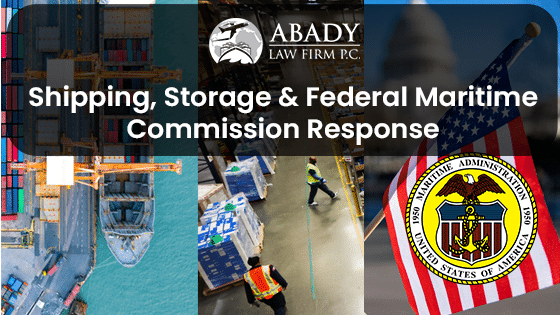The Federal Maritime Commission (FMC) is an independent United States government agency that regulates the nation’s international ocean shipping industry. The commission works to ensure that the shipping industry remains fair and competitive while advancing the interests of American consumers.
If you’re thinking about shipping goods overseas or storing them for an extended period of time, it is important that you familiarize yourself with the rules and regulations established by the FMC.
Read on to learn more about shipping, storage, and the FMC’s role in regulating these industries.
What Is The Federal Maritime Commission (FMC)
The Federal Maritime Commission (FMC) is a United States government agency that was established on August 12, 1961. The commission is responsible for regulating the nation’s international ocean shipping industry.
One of the FMC’s primary goals is to ensure that the shipping industry remains fair and competitive. The commission also works to advance the interests of American consumers.
The FMC consists of five commissioners who are appointed by the president and confirmed by the Senate. The commissioners are responsible for developing policies and regulations that govern the shipping industry. They also oversee compliance with those rules and regulations, handle complaints from the public, and carry out other duties as necessary.
What Is The Shipping Act of 1984
The Shipping Act of 1984 is a United States law that regulates the domestic ocean shipping industry. This act was created to help protect the interests of American shippers and consumers, and it establishes certain requirements for all vessels operating in U.S. waters.
Some of the key provisions of this act include rules about price-setting practices, carrier liability for cargo loss or damage, container weights and dimensions, and more.
What Is The Ocean Shipping Reform Act of 1998
The Ocean Shipping Reform Act of 1998 (OSRA) is a United States law that amended the Shipping Act of 1984. This act was created in response to concerns that the shipping industry was not operating in a fair and competitive manner.
One of the major goals of the OSRA was to promote the development and growth of US exports by making it easier for American companies to ship their goods overseas.
The OSRA made several changes to the rules and regulations governing the shipping industry, including provisions about service contracts, conference agreements, and pricing practices.
Detention and Demurrage, and Data Initiatives
The Federal Maritime Commission (FMC) has been working to address issues related to detention and demurrage expenses, as well as data initiatives.
In recent months, the FMC has urged carriers industrywide to adopt detention and demurrage best practices.
These best practices include setting reasonable rates for these services, providing clear communication with customers regarding charges, and resolving any disputes in a timely manner.
Additionally, the Maritime Transportation Data Initiative (MTDI) was launched in an effort to improve the state of data storage and access within the shipping industry.
The MTDI has three primary objectives, which are documenting the current state of maritime data, identifying critical data gaps, and proposing standards for unified data definitions/classifications and accessible access policies/protocols.
The Ocean Shipping Reform Act Hearing
On March 3, 2022, Daniel B. Maffei, chairman of the Federal Maritime Commission, appeared before the Senate Commerce Committee to discuss the state of the ocean shipping industry.
Maffei said that in response to concerns about the state of competition and fairness in the industry, the FMC has been working to improve compliance with key regulations.
Specifically, he highlighted recent efforts to strengthen enforcement of price-setting practices, address issues related to detention and demurrage fees, and promote data initiatives that will help to improve transparency within the industry.
Conclusion
The Federal Maritime Commission (FMC) is an important organization that helps to ensure that shipping, storing, and transporting goods is fair and equitable.
If you are involved in any aspect of the shipping industry, it is essential that you familiarize yourself with the regulations established by the FMC.
Abady Law Firm specializes in international trade regulation and can help you ensure that you are in compliance with all relevant laws. If you have any questions or concerns, please do not hesitate to contact us.


